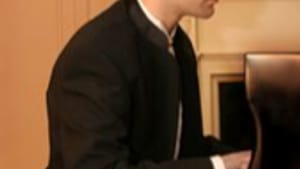Stay in the Loop
BSR publishes on a weekly schedule, with an email newsletter every Wednesday and Thursday morning. There’s no paywall, and subscribing is always free.
Franz Liszt is his agent
Sandro Russo's Lisztomania

To say that the pianist Sandro Russo loves the music of Franz Liszt is a profound understatement. "I can't live without him," he told me, explaining that he admires the way this 19th-Century Hungarian pianist and composer culled inspiration from anything— religion, paintings, literature, any and all emotion, just to name a few examples.
Russo calls Liszt "my musical master," a type of reverence that's usually reserved, at least in North American musical circles, for Bach, Brahms and Beethoven. Then again, if every pianist had Sandro Russo's technique, he or she might play more of Liszt's piano music, which might, in turn, lead to more such disciples of his output.
It isn't just Liszt's bravura pieces that Russo adores, however. One of several reasons he became the very first actual friend I met on Myspace was our shared love of playing very, very softly, when the occasion warrants, in keeping with our mutual interest in creating a widely varied tonal palette. This part of Russo's playing and Liszt's art are explored in his recent DVD, "Sandro Russo Plays the 1862 Bechstein Liszt Piano" (Available in late May at www.sandrorussopianist.com.)
A string of honors
Russo was born in San Giovanni Gemini, Sicily, graduated summa cum laude from the Vincenzo Bellini Conservatory and received the Pianoforte Performing Diploma "with honors" from the Royal College of Music in London, picking up numerous prizes in national and international competitions along the way. He came to New York in 2000 and won the Bergen Philharmonic Orchestra Competition soon afterward. Since then, he has given concerts in Carnegie Hall (in Weill Recital Hall and Zankel Hall) in addition to appearing in other venues, nationally and internationally.
He has performed with the Brussels Chamber Orchestra under Michael Guttman, the Sinfonica Siciliana with Tomasz Bugaj, the Slovak Philharmonic conducted by Tomas Hanus, and the Jacksonville Symphony under Fabio Mechetti. Russo has also performed in such world-famous halls as the Concertgebuow in Amsterdam and the Salle Cortot in Paris and premiered compositions by Lowell Liebermann, Paul Moravec, and Marc-Andre Hamelin. This year he will perform in San Francisco, Chicago and Manchester, U.K. as well as touring Japan with the New York Asian Symphony Orchestra.
Not bad for a pianist who has no agent.
Serendipity with a Bechstein
Since Russo represents himself, he often must create his own opportunities. One such endeavor led to his life-altering encounter with Liszt's piano. In the fall of 2008, Russo approached John Skidmore, general manager of the New York Bechstein Piano Centre, about the possibility of performing on one of the fabulous pianos in the showroom. (To Americans, Steinway is the name associated with great pianos, but to many pianists— including me— playing a Bechstein is a particularly glorious experience. The nine-foot grand I was lucky enough to play seemed to read my mind, allowing me to produce effortlessly every nuance imaginable.)
When Russo called, as it happens, the Bechstein store was planning a joint recital to celebrate the arrival from Germany of Liszt's 1862 Bechstein, and Skidmore invited Russo to participate in this event. That performance led to an invitation to give a solo recital at the Bechstein Centre, with the opportunity to play an encore on the historic 1862 piano. Sandro's first performance on Liszt's instrument was of the composer's Consolation in D Flat Major, an experience Sandro described as "thrilling" and "history come to life."
Chance of a lifetime
That encore led to the chance of a lifetime: the opportunity to immortalize the historic piano's first tour of the U.S. by recording a DVD. Apparently, the Liszt piano had never been recorded or even used for a public performance after Liszt's death, so such unprecedented access was special indeed.
But first a few issues needed to be resolved. The piano was 147 years old, and although it was in excellent condition otherwise, the damper pedal had begun to squeak. Far more problematic was the fact that the Liszt Bechstein was due back in Germany in two weeks, so all the arrangements had to be made right away, including the preparation of repertoire. And even though Liszt's robust pianism had helped end the era of the wooden-framed piano (cast iron was needed to withstand his virtuosity), his Bechstein was a museum piece. So Skidmore told Sandro that pyrotechnical displays were off-limits.
In the end, Sandro chose to play the first three of Liszt's Consolations, the Schubert-Liszt Ave Maria, and two pieces "in the spirit" of Liszt: the Myra Hess arrangement of Bach's Jesu, Joy of Man's Desiring and a transcription of Gluck's Dance of the Blessed Spirits from Orpheus.
To live in another world
How does it feel to play the piano that once belonged to your idol? Sandro spoke of "a profoundly stirring connection with the essential being and very soul of Liszt as I performed his work, touching the actual keys and pedals of the instrument Liszt had once played." The tone of the instrument is impossible to convey in words, so I've included a link to Sandro Russo's performance of the Consolation in D Flat Major.
Although he was forced to acclimate to the piano's unfamiliar timbre and change his pedaling to accommodate the deterioration of the pedal's mechanical parts, Sandro said he felt "no limitations—only inspiration."
After spending several hours recording on the 1862 Bechstein, Sandro said, he turned on his car radio and found the sonority of the modern piano jarring. "For a moment," he said, "I really believed I could live in another world, thanks to that piano."
Russo calls Liszt "my musical master," a type of reverence that's usually reserved, at least in North American musical circles, for Bach, Brahms and Beethoven. Then again, if every pianist had Sandro Russo's technique, he or she might play more of Liszt's piano music, which might, in turn, lead to more such disciples of his output.
It isn't just Liszt's bravura pieces that Russo adores, however. One of several reasons he became the very first actual friend I met on Myspace was our shared love of playing very, very softly, when the occasion warrants, in keeping with our mutual interest in creating a widely varied tonal palette. This part of Russo's playing and Liszt's art are explored in his recent DVD, "Sandro Russo Plays the 1862 Bechstein Liszt Piano" (Available in late May at www.sandrorussopianist.com.)
A string of honors
Russo was born in San Giovanni Gemini, Sicily, graduated summa cum laude from the Vincenzo Bellini Conservatory and received the Pianoforte Performing Diploma "with honors" from the Royal College of Music in London, picking up numerous prizes in national and international competitions along the way. He came to New York in 2000 and won the Bergen Philharmonic Orchestra Competition soon afterward. Since then, he has given concerts in Carnegie Hall (in Weill Recital Hall and Zankel Hall) in addition to appearing in other venues, nationally and internationally.
He has performed with the Brussels Chamber Orchestra under Michael Guttman, the Sinfonica Siciliana with Tomasz Bugaj, the Slovak Philharmonic conducted by Tomas Hanus, and the Jacksonville Symphony under Fabio Mechetti. Russo has also performed in such world-famous halls as the Concertgebuow in Amsterdam and the Salle Cortot in Paris and premiered compositions by Lowell Liebermann, Paul Moravec, and Marc-Andre Hamelin. This year he will perform in San Francisco, Chicago and Manchester, U.K. as well as touring Japan with the New York Asian Symphony Orchestra.
Not bad for a pianist who has no agent.
Serendipity with a Bechstein
Since Russo represents himself, he often must create his own opportunities. One such endeavor led to his life-altering encounter with Liszt's piano. In the fall of 2008, Russo approached John Skidmore, general manager of the New York Bechstein Piano Centre, about the possibility of performing on one of the fabulous pianos in the showroom. (To Americans, Steinway is the name associated with great pianos, but to many pianists— including me— playing a Bechstein is a particularly glorious experience. The nine-foot grand I was lucky enough to play seemed to read my mind, allowing me to produce effortlessly every nuance imaginable.)
When Russo called, as it happens, the Bechstein store was planning a joint recital to celebrate the arrival from Germany of Liszt's 1862 Bechstein, and Skidmore invited Russo to participate in this event. That performance led to an invitation to give a solo recital at the Bechstein Centre, with the opportunity to play an encore on the historic 1862 piano. Sandro's first performance on Liszt's instrument was of the composer's Consolation in D Flat Major, an experience Sandro described as "thrilling" and "history come to life."
Chance of a lifetime
That encore led to the chance of a lifetime: the opportunity to immortalize the historic piano's first tour of the U.S. by recording a DVD. Apparently, the Liszt piano had never been recorded or even used for a public performance after Liszt's death, so such unprecedented access was special indeed.
But first a few issues needed to be resolved. The piano was 147 years old, and although it was in excellent condition otherwise, the damper pedal had begun to squeak. Far more problematic was the fact that the Liszt Bechstein was due back in Germany in two weeks, so all the arrangements had to be made right away, including the preparation of repertoire. And even though Liszt's robust pianism had helped end the era of the wooden-framed piano (cast iron was needed to withstand his virtuosity), his Bechstein was a museum piece. So Skidmore told Sandro that pyrotechnical displays were off-limits.
In the end, Sandro chose to play the first three of Liszt's Consolations, the Schubert-Liszt Ave Maria, and two pieces "in the spirit" of Liszt: the Myra Hess arrangement of Bach's Jesu, Joy of Man's Desiring and a transcription of Gluck's Dance of the Blessed Spirits from Orpheus.
To live in another world
How does it feel to play the piano that once belonged to your idol? Sandro spoke of "a profoundly stirring connection with the essential being and very soul of Liszt as I performed his work, touching the actual keys and pedals of the instrument Liszt had once played." The tone of the instrument is impossible to convey in words, so I've included a link to Sandro Russo's performance of the Consolation in D Flat Major.
Although he was forced to acclimate to the piano's unfamiliar timbre and change his pedaling to accommodate the deterioration of the pedal's mechanical parts, Sandro said he felt "no limitations—only inspiration."
After spending several hours recording on the 1862 Bechstein, Sandro said, he turned on his car radio and found the sonority of the modern piano jarring. "For a moment," he said, "I really believed I could live in another world, thanks to that piano."
Sign up for our newsletter
All of the week's new articles, all in one place. Sign up for the free weekly BSR newsletters, and don't miss a conversation.

 Maria Thompson Corley
Maria Thompson Corley